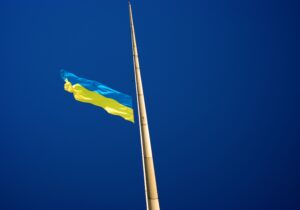Ukraine has been painted with the dishonest brush of moral equivalency
Beware of NGOs who claim to be authorities on international justice. Amnesty International, the global human rights watchdog with a self-described mandate to take injustice personally, published a deeply flawed report on Russia’s war of aggression against Ukraine. The organization’s report rebuked Ukrainian forces for violating international humanitarian law by operating weapons systems in areas populated by civilians. International media reports often reference AI and cite it as a credible authority, giving AI an influential role in matters of war, especially in a way wherein the defending nation is reliant on maintaining support from Western nations.
Firstly, some respected analysts have raised the possibility that Amnesty International (AI) has been using information provided by pro-Russian propagandists and that perhaps pro-Russian operatives have even infiltrated the organization. These claims are worth noting, especially since Russia’s use of information warfare is well-documented during times of peace, and even more so during times of war. Still, the claims remain understandably impossible to prove. And speaking of things one cannot prove, the AI leader of this bombshell project, Donatella Rovera, has a history of making accusations that were downright scandalous in the wrongness of the assumptions and basic logic. (As Gerald Steinberg wrote, “I debated Rovera on Al Jazeera following the publication of a report accusing Israel of depriving Palestinians of water. I pointed out basic errors and contradictions in the report and in Rovera’s presentation which exposed her lack of expertise and credibility.”)
After AI published its findings, CBS news yanked a documentary before it aired and removed a clip of the documentary from its website. The documentary included information based on Rovera’s “analysis” such as shocking assertions like “only 30 percent of Western weapons supplied [to Ukraine] were reaching the front.” Yet others have pointed out how unbelievable her claims are. How could Rovera know any of the deepest secrets of the Ukrainian military like where their weapons are since the military is intentionally hiding that information from the Russian army trying to destroy them? And with so many Western nations closely watching the war, and considering the US government is highly motivated to ensure the very thing Rovera accuses Ukraine of doing does not occur, the burden of proof is high and she does nothing to meet it. Curious indeed.
Regardless of the messenger, we can assess AI’s arguments and see that it relies on flawed assumptions that discredit the report.
The laws of war are a Western conception, derivative of the West’s view of justice, rooted in the just war tradition. The JWT assesses the jus ad bellum (cause of entry into war) as well as jus in bello (conduct during war). This latter piece, the conduct during war, is what the laws of war seek to regulate. A country can be the victim of aggression, as Ukraine clearly is in the case of Russia’s brutal war of choice against a sovereign nation, and therefore not in violation of the principles of jus ad bello, while not being exempt from seeking to carry out its just defense with concern for justice throughout. When evaluating one’s actions during the war, however, it is vital that one not lose sight of the war’s cause or an understanding of who is the aggressor and the defender.
Just conduct during war requires that political innocents such as civilians are defended and that collateral damage be as limited as possible in pursuit of the larger goal which is to protect innocents and end the unjust aggression. Practically, it means that a military can neither seek to maximize innocent casualties by targeting civilians directly, nor use civilians as shields to give greater protection to combatants.
The patterns of the war show that not only is Russia in violation of jus ad bello but also in violation of the principles of jus in bellum.
Early on, the Russians began targeting civilian centers, employing weapons that would maximize civilian death and injury. A few notorious examples of civilian targeting are the Mariupol maternity hospital that was hit on March 10 after a week of Russian shelling that left at least 1,200 civilians dead in just that city alone; the Mariupol Art School No. 12, hit by Russian missiles on March 20 with 400 civilians sheltering inside; and sixty Ukrainian civilians killed in a May 8 airstrike on a school in Bilohorivka, a village 60 miles northwest of the Russian-controlled city of Luhansk. And we are just scratching the surface.
Beyond air strikes, civilians have been the target of ghastly and well-documented offenses—which many have described as war crimes. In Bucha, a suburb of Kyiv, satellite images began to appear in April showing civilian mass gravesites as well as corpses littered across residential streets and yards. The monitor Human Rights Watch released a May report deeming these crimes in Bucha and elsewhere near Kyiv, including countless cases of torture and executions, war crimes. Most appalling of all, multiple reports exist claiming that Russian forces have raped men, women, and children—the youngest known victim just one-year old—in their march through Ukraine.
In stark contrast, Ukraine’s actions from the start of the war and throughout have been broadly reflective of the desire to protect innocents and to stop the military aggressor that is killing and seeking to kill innocents through its indiscriminate strikes. It has done so by organizing breathtakingly complex civilian evacuations, prioritizing the safe passage of women, elderly, and children through the shelling and rubble.
On May 7, at the height of persistent airstrikes on Mariupol, Ukrainian officials announced that all civilians had been evacuated from a large steel plant in the city—a primary target of Russian strikes. Ukrainian forces went to painstaking lengths to evacuate and save civilian lives during one of the most sustained air campaigns of this now six-month war.
And earlier this month, President Zelenksy called for the mandatory evacuation of civilians from Donetsk Oblast, the long-contested region in eastern Ukraine that has become the war’s newest front line. All the while, Ukraine is conducting military operations to simultaneously repel the Russians and retake or regain Ukrainian territory.
Where Ukraine is establishing bases in population centers, it seems pretty clear that it is doing so because that is where the Russians are attacking. Air defense systems are most effective when employed closest to the targets. Declaring that Ukraine is negligent with civilian lives in such grievous ways as the AI report claims goes against all of the other known Ukrainian actions throughout the war. It doesn’t necessarily mean they can’t be true, but as already stated, the burden on the accuser is high and AI does not deliver.
The Amnesty International report reminds of a 2009 interview with Jean Bethke Elshtain, the late just war ethicist, on the dangerous of moral confusion in international affairs.
“What does one do, for example, with the phenomenon of a death camp. How do you describe that? Do you say it’s just bad?” Elshtain wonders.
“It is the outcropping of evil in the world through human action, and if we lose again our ability to name that and to figure out how to best oppose it and combat it, we’ve lost a great deal,” said Elshtain.
“And we fall into sort of this strange world where…you can’t distinguish that which is good or better from that which is evil.” In reading the Amnesty International report admonishing Ukraine for doing what it must to fight for its survival in a just war, one can only conclude that the organization suffers from that which Elshtain warned of.






